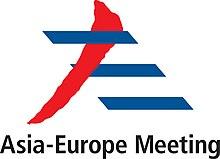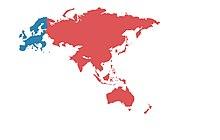Asia–Europe Meeting (ASEM) | |
|---|---|
| Type | Political Dialogue Forum |
| Partnership | 53 ASEM Partners[1] |
| Establishment | 1996 |
Website www.ASEMInfoBoard.org | |
The Asia–Europe Meeting (ASEM) is an Asian–European political dialogue forum to enhance relations and various forms of cooperation between its partners. It was officially established on 1 March 1996 at the 1st ASEM Summit (ASEM1) in Bangkok, Thailand, by the then 15 Member States of the European Union (EU) and the European Commission, the then 7 Member States of the Association of Southeast Asian Nations (ASEAN), and the individual countries of China, Japan, and South Korea.[2] A series of enlargements saw additional EU Member States join as well as India, Mongolia, Pakistan and the ASEAN Secretariat in 2008, Australia, New Zealand and Russia in 2010,[3] Bangladesh, Norway, and Switzerland in 2012,[4] as well as Croatia, and Kazakhstan, in 2014.
The main components of the ASEM Process rest on the following 3 pillars:
- Political Pillar
- Economic & Financial Pillar
- Social, Cultural & Educational Pillar
In general, the ASEM Process is considered by the Partners involved to be a way of deepening the relations between Asia and Europe at all levels, which is deemed necessary to achieve a more balanced political and economic world order. The process is enhanced by the biennial meetings of Heads of State and Government, alternately in Asia and Europe, and biennial meetings of Foreign Ministers as well as other Ministerial Meetings, and other political, economic, and socio-cultural events at various levels.
Partners
The ASEM Partnership currently has 53 Partners: 51 countries and 2 regional organisations. The countries are Australia, Austria, Bangladesh, Belgium, Brunei Darussalam, Bulgaria, Cambodia, China, Croatia, Cyprus, Czechia, Denmark, Estonia, Finland, France, Germany, Greece, Hungary, India, Indonesia, Ireland, Italy, Japan, Kazakhstan, Laos, Latvia, Lithuania, Luxembourg, Malaysia, Malta, Mongolia, Myanmar, the Netherlands, New Zealand, Norway, Pakistan, the Philippines, Poland, Portugal, Romania, Russia, Singapore, Slovakia, Slovenia, South Korea, Spain, Sweden, Switzerland, Thailand, United Kingdom and Vietnam, while the European Union and the ASEAN Secretariat are the regional organisations involved.[1]
Meetings
ASEM Summits
Biennial Summits are held alternating between Asia and Europe, attended by the Heads of State and Government of the respective partner countries and organisations:
- ASEM13: 2021, Phnom Penh, Cambodia

- ASEM12: 18–19 October 2018, Brussels, Belgium, hosted by the European Union

- ASEM11: 15–16 July 2016, Ulaanbaatar, Mongolia

- ASEM10: 16–17 October 2014, Milan, Italy

- ASEM9: 05–06 November 2012, Vientiane, Laos

- ASEM8: 04–05 October 2010, Brussels, Belgium
.svg.png)
- ASEM7: 24–25 October 2008, Beijing, China

- ASEM6: 10–11 September 2006, Helsinki, Finland

- ASEM5: 08–09 October 2004, Hanoi, Vietnam

- ASEM4: 22–24 September 2002, Copenhagen, Denmark

- ASEM3: 20–21 October 2000, Seoul, Korea

- ASEM2: 03–04 April 1998, London, United Kingdom

- ASEM1: 01–02 March 1996, Bangkok, Thailand

ASEM Ministerial Meetings
Aside from Summits, regular Ministerial Meetings are held on foreign affairs, financial, cultural, economic, educational, labor and employment, transport, or environmental issues, attended by the relevant ministers:
ASEM Foreign Ministers' Meetings (ASEMFMM)
- ASEMFMM14: 15-16 December 2019, Madrid, Spain

- ASEMFMM13: 20–21 November 2017, Naypyidaw, Myanmar

- ASEMFMM12: 05–06 November 2015, Luxembourg, Luxembourg

- ASEMFMM11: 11–12 November 2013, New Delhi, India

- ASEMFMM10: 06–07 June 2011, Gödöllő, Hungary

- ASEMFMM9: 25–26 May 2009, Hanoi, Vietnam

- ASEMFMM8: 28–29 May 2007, Hamburg, Germany

- ASEMFMM7: 06–07 May 2005, Kyoto, Japan

- ASEMFMM6: 17–18 April 2004, Kildare, Ireland

- ASEMFMM5: 23–24 July 2003, Bali, Indonesia

- ASEMFMM4: 06–07 June 2002, Madrid, Spain

- ASEMFMM3: 24–25 May 2001, Beijing, China

- ASEMFMM2: 29 March 1999, Berlin, Germany

- ASEMFMM1: 15 February 1997, Singapore, Singapore

ASEM Finance Ministers’ Meetings (ASEMFinMM)
- ASEMFinMM14: 2020, Dhaka, Bangladesh

- ASEMFinMM13: 26 April 2018, Sofia, Bulgaria

- ASEMFinMM12: 09–10 June 2016, Ulaanbaatar, Mongolia

- ASEMFinMM11: 11–12 September 2014, Milan, Italy

- ASEMFinMM10: 15 October 2012, Bangkok, Thailand

- ASEMFinMM9: 17–18 April 2010, Madrid, Spain

- ASEMFinMM8: 16 June 2008, Jeju, South Korea

- ASEMFinMM7: 08–09 April 2006, Vienna, Austria

- ASEMFinMM6: 25–26 June 2005, Tianjin, China

- ASEMFinMM5: 05–06 July 2003, Bali, Indonesia

- ASEMFinMM4: 05–06 July 2002, Copenhagen, Denmark

- ASEMFinMM3: 13–14 January 2001, Kobe, Japan

- ASEMFinMM2: 15–16 September 1999, Frankfurt, Germany

- ASEMFinMM1: 19 September 1997, Bangkok, Thailand

ASEM Culture Ministers' Meetings (ASEMCMM)
- ASEMCMM9: 2020, Asia
- ASEMCMM8: 01-02 March 2018, Sofia, Bulgaria

- ASEMCMM7: 22–24 June 2016, Gwangju, South Korea

- ASEMCMM6: 20–21 October 2014, Rotterdam, Netherlands

- ASEMCMM5: 18–19 September 2012, Yogyakarta, Indonesia

- ASEMCMM4: 08–10 September 2010, Poznań, Poland

- ASEMCMM3: 21–24 April 2008, Kuala Lumpur, Malaysia

- ASEMCMM2: 06–07 June 2005, Paris, France

- ASEMCMM1: 03 December 2003, Beijing, China

ASEM Economic Ministers' Meetings (ASEMEMM)
- ASEMEMM7: 21–22 September 2017, Seoul, South Korea

- High-level Meeting: 16-17 September 2005, Rotterdam, Netherlands

- ASEMEMM5: 23–24 July 2003, Dalian, China

- ASEMEMM4: 18–19 September 2002, Copenhagen, Denmark

- ASEMEMM3: 10–11 September 2001, Hanoi, Vietnam

- ASEMEMM2: 09–10 October 1999, Berlin, Germany

- ASEMEMM1: 27–28 September 1997, Makuhari, Japan

ASEM Education Ministers' Meetings (ASEMME)
- ASEMME8: 2021, Thailand

- ASEMME7: 15-16 May 2019, Bucharest, Romania

- ASEMME6: 21–22 November 2017, Seoul, Korea

- ASEMME5: 27–28 April 2015, Riga, Latvia

- ASEMME4: 12–14 May 2013, Kuala Lumpur, Malaysia

- ASEMME3: 09–10 May 2011, Copenhagen, Denmark

- ASEMME2: 14–15 May 2009, Hanoi, Vietnam

- ASEMME1: 05–06 May 2008, Berlin, Germany

ASEM Labour & Employment Ministers’ Conferences (ASEMLEMC)
- ASEMLEMC5: 03–04 December 2015, Sofia, Bulgaria

- ASEMLEMC3: 12–14 December 2010, Leiden, Netherlands

- ASEMLEMC2: 13–15 October 2008, Bali, Indonesia

- ASEMLEMC1: 03 September 2006, Potsdam, Germany

ASEM Transport Ministers' Meetings (ASEMTMM)
- ASEMTMM5: 11-12 December 2019, Budapest, Hungary

- ASEMTMM4: 26–28 September 2017, Bali, Indonesia

- ASEMTMM3: 29–30 April 2015, Riga, Latvia

- ASEMTMM2: 24–25 October 2011, Chengdu, China

- ASEMTMM1: 19–20 October 2009, Vilnius, Lithuania

ASEM Environment Ministers' Meetings (ASEMEnvMM)
- ASEMEnvMM4: 22–23 May 2012, Ulaanbaatar, Mongolia

- ASEMEnvMM3: 23–26 April 2007, Copenhagen, Denmark

- ASEMEnvMM2: 12–13 October 2003, Lecce, Italy

- ASEMEnvMM1: 17 January 2002, Beijing, China

ASEM Ministerial Conference on Energy Security (ASEMESMC)
See also
- Asia-Europe Foundation (ASEF), the only permanently established institution under the ASEM framework
References
- ^ a b http://www.aseminfoboard.org/about/partners
- ^ Lay Hwee Yeo (2003). Asia and Europe: the development and different dimensions of ASEM. Routledge (UK). ISBN 0-415-30697-3.
- ^ ASEM ministers wrap up ‘productive’ session
- ^ ASEF's Expansion
External links
- ASEM InfoBoard, the official information platform of the Asia-Europe Meeting (ASEM)
- Introduction to the Asia-Europe Meeting
- ASEM in Its Tenth Year: Looking Forward, Looking Back
- Asia-Europe Business Forum (AEBF)
- Asia-Europe People's Forum (AEPF)
- Asia-Europe Parliamentary Partnership (ASEP)
- Asia-Europe Labour Forum (AELF)
- ASEM Education Secretariat (AES)
- Asia-Europe Foundation (ASEF), the only permanently established institution under the ASEM framework
- ASEF culture360
- ASEF Classroom Network (ASEF ClassNet)
- Asia-Europe Museum Network (ASEMUS)
- ASEF University Alumni Network (ASEFUAN)
- Asia-Europe Institute (AEI)

